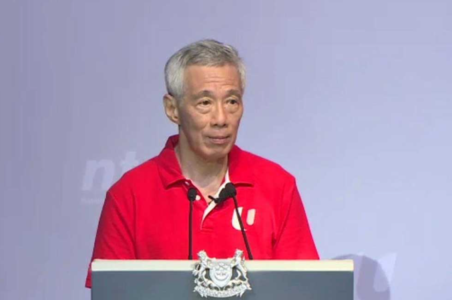In a challenging global landscape, Prime Minister Lee Hsien Loong discusses the economic impacts of the Ukraine conflict and the urgent need for transformation.
Prime Minister Lee Hsien Loong announced on Sunday (May 1) that Singapore may face a recession within the next two years, particularly due to the ongoing war in Ukraine.
“At the beginning of the year, we were cautiously optimistic about our post-COVID recovery, but the outlook has become more uncertain,” Mr. Lee told unionists at Downtown East during the May Day Rally.
He acknowledged that as the country emerges from the pandemic, it is confronting not only the aftermath of COVID-19 but also significant global security challenges. “We are feeling the headwinds, even as we recognize new opportunities on the horizon,” he noted in a Facebook post on Sunday. He added that these “global headwinds” have cost Singapore approximately S$8 billion annually.
Discussing Russia’s invasion of Ukraine, Mr. Lee stated that there appears to be “no good outcome in sight,” and that the conflict may continue for “quite a while longer.” He emphasized that if the war escalates or spreads beyond Ukraine, the situation could become uncontrollable.
Singapore is already experiencing the repercussions of the war through rising living costs and worsening inflation. As a major exporter of commodities like oil, gas, and food products, Russia’s actions have triggered a global energy crisis and increased food prices.
“The government is doing everything possible to alleviate the impact on Singaporeans and ease cost-of-living pressures,” Mr. Lee stated. However, he pointed out that “Singapore is tightly integrated into the global economy, and given our small size, we will always be a price taker in world markets, meaning we cannot escape these global challenges.”
According to the Ministry of Trade and Industry, Singapore is expected to incur losses of about S$8 billion per year, which equates to 1.5 percent of its Gross Domestic Product.
“That means we have collectively become S$8 billion poorer each year, and there is no way around this,” Mr. Lee explained.
While government support schemes can help alleviate immediate burdens, “this does not address our long-term issues,” he added. The fundamental challenge lies in rising energy and food prices, necessitating increased productivity.
“The need for business and workforce transformation has never been more urgent. We must continually reinvent ourselves to maintain our position in the global landscape,” he urged.
Mr. Lee concluded by expressing confidence in Singapore’s tripartite partnership, which has historically helped the nation navigate crises. “Having faced COVID-19 together, we can be assured of overcoming future challenges and seizing opportunities that lie ahead,” he stated.








